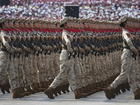Construction work has intensified on a major new structure at a facility key to Israel's long-suspected atomic weapons program, according to satellite images analyzed by experts. They say it could be a new reactor or a facility to assemble nuclear arms — but secrecy shrouding the program makes it difficult to know for sure.
The work at the Shimon Peres Negev Nuclear Research Center near the city of Dimona will renew questions about Israel's widely believed status as the Mideast's only nuclear-armed state.
 Full Story
Full Story
Chinese leader Xi Jinping said humanity must choose between peace and war and dialogue and confrontation in a speech Wednesday before a major military parade marking the 80th anniversary of the end of World War II.
Xi started a brief address by remembering the Chinese veterans of the war and called for the eradication of the roots of war to prevent history from repeating itself. But his main message was forward looking: Today, China is strong, fears no one and is ready to take a leading role in the world.
 Full Story
Full Story
Spanish club Villarreal is facing backlash from some of its fans after a last-minute deal to sign an Israeli player who has publicly supported his nation in its war with Hamas.
Some fans criticized Villarreal through social media posts after the club signed forward Manor Solomon near the end of the transfer deadline late Monday.
 Full Story
Full Story
India warned Pakistan about possible cross-border flooding for the second time in as many weeks as monsoon deluges cause death and widespread destruction in both countries.
The disaster management authority in eastern Pakistan announced the warning Tuesday.
 Full Story
Full Story
U.S. stocks are tumbling on Tuesday, and some of Wall Street's biggest stars are leading the way lower.
The S&P 500 sank 1.2% and was on track for its worst loss in a month. The Dow Jones Industrial Average was down 498 points, or 1.1%, as of 9:37 a.m. Eastern time, and the Nasdaq composite was down a market-leading 1.4%. All three are still close to their recently set records.
 Full Story
Full Story
France's Prime Minister François Bayrou is scrambling to save his government and his job, holding talks this week with leaders across the political spectrum — including far-right leader Marine Le Pen — ahead of a parliamentary confidence vote on his government's plan to cut public spending.
 Full Story
Full Story
China's missiles, fighter jets and other military hardware — some on public view for the first time — will be displayed in a major parade on Wednesday in the nation's capital.
 Full Story
Full Story
European football now focuses on qualifying for the 2026 World Cup with recent champions France, Germany and Spain among the nations starting a six-game, 11-week sprint to advance to the tournament being played across North America.
The European qualifying program returns Thursday with six days of games involving 54 teams — 24 of them kicking a first ball on their intended road to play on football's biggest stage in the United States, Canada and Mexico starting June 11.
 Full Story
Full Story
English football — and Liverpool, in particular — flexed its financial muscles in unprecedented fashion in a summer transfer window that highlighted the growing imbalance in the European game as well as the effect player power can have in securing a move.
Here's what we learned from the last two months in the transfer market:
 Full Story
Full Story
It's tomato season and Lidia is harvesting on farms in California's Central Valley.
She is also anxious. Attention from U.S. Immigration and Customs Enforcement could upend her life more than 23 years after she illegally crossed the U.S.-Mexico border as a teenager.
 Full Story
Full Story



